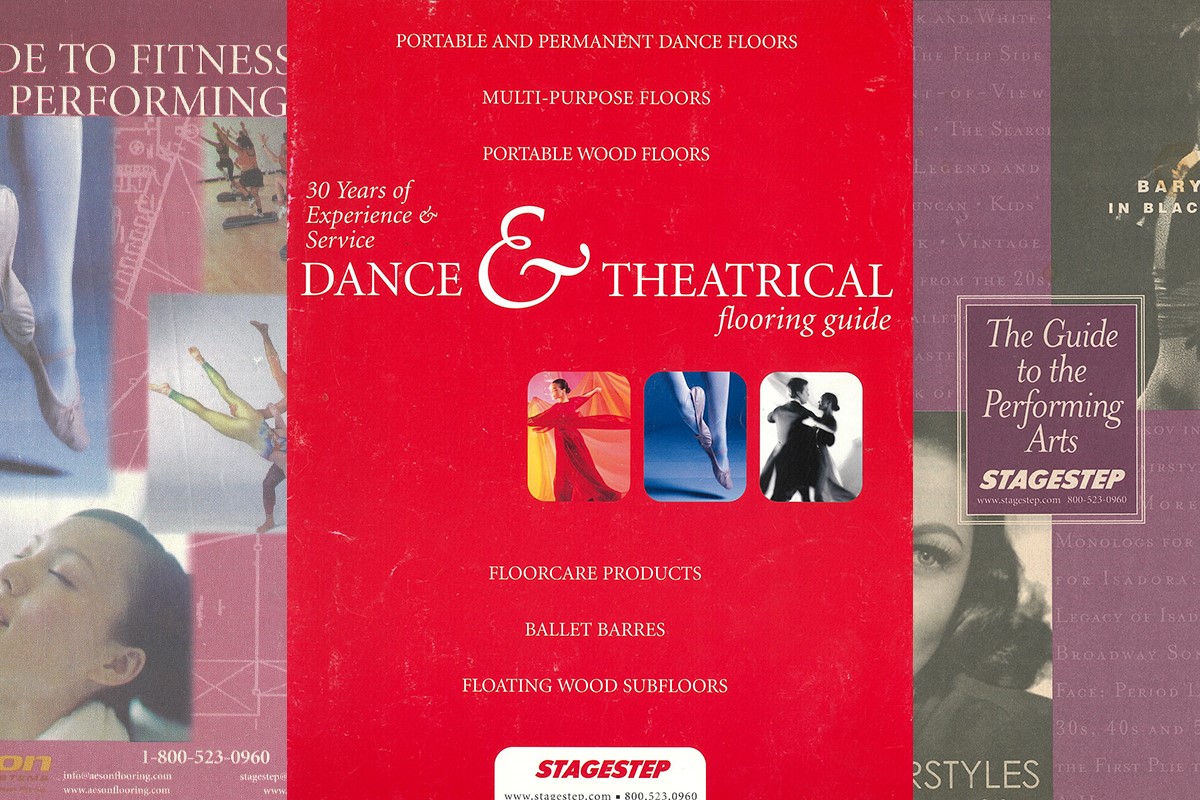In the beginning, all we had were wood dance floors, and if we were lucky, a basket-weave floating subfloor underneath.
Linoleum was used for a time, but it was heavy and very weather sensitive. It would shatter like glass in cold weather. The majority of dance studios had VCT tile sitting directly on concrete. No one knew better.
Then, one day, the Marley Company in England came up with the reversible, flexible, lightweight “Stageflor”. That was the original name. Both the company and name are now history. The term Marley has been appropriated meaning any PVC roll out flooring designed for dance. Early on, only professional ballet companies latched onto Marley’s “Stageflor”. Back then, you had to order your floor directly from Marley, and they would ship it to you five months later.
You had to handle the paperwork, duty and get it picked up from the dock. It wasn’t easy, but the floor was so inexpensive at the time, dance companies would throw out their dance floor after one season and order a new one for the next season. Prior to the oil crisis, gas prices were 25 cents a gallon (They pumped your gas, cleaned your windshield and gave away sets of glasses and china.), and PVC is a derivative of oil. There was no dance floor business and no stock of flooring in the USA. You had to wait five months. Period.
In 1967, fresh out of college, I started F. Randolph Associates. It was a company devoted to providing services to the performing arts community. We represented dancers, teachers, choreographers, a conductor and an expert on subscription. Soon thereafter, we were selling records, videos, gifts and books in a newsletter called Footnotes. This little publication grew to 96 pages, and our pitch was, “If you need it, we can get it for you.”
One day, we got a frantic call from a Mississippi customer in need of a Marley dance floor in two weeks. A task at the time that seemed at best, improbable. We picked up the phone and called the Pennsylvania Ballet. The ballet company had not yet thrown out its floor. They were very amenable to getting a new floor in exchange for their used one. The Mississippi crew were happy to secure a Marley floor when they needed it.
I remember driving to the ballet company’s studio and stuffing the rolls of floor into my car with half of the rolls sticking out of the rear window, driving to the airport and shipping them air express to Mississippi.
Fifty years ago, “Stageflor” cost $1.60 a square yard. A 30 x 30 floor was $160.00 plus shipping and duty. It was so inexpensive that instead of cleaning and storing them, dance companies would order a new one for delivery in the fall.
I made $25 for my efforts that day; however, it sparked an idea that we could handle the logistics and paperwork for future orders, and so we did.
That was the beginning of Stagestep™, a subsidiary of F. Randolph Associates.
After a bit, we were bringing in full rolls of “Stageflor” into a temporary warehouse with no heat, where we custom cut them by hand for each customer. Now the wait time was reduced to a month.
By 1983, the tail was wagging the dog, and we changed our corporate name to Stagestep™.
In the ensuing years, Stagestep™ introduced the first multipurpose floor, Timestep™; the first foam-backed floor for ballet, Quietstep™; and the first foam-backed roll out floor that could be directly installed on a concrete slab, Dancestep™.
Stagestep™ was the first to introduce cross-link cell foam cubes, blocks and forms to the dance world in order to create inexpensive floating subfloors. Stagestep™ went on to be the first company to introduce dance floor finish for vinyl and wood floor surfaces, FloorShield™. We also invented SlipNoMor™, the liquid rosin used by studios around the world.
Moving into the 21st century, Stagestep™ introduced dance floor products including vapor barrier, vented cove base and ReUseIt™, a release mesh ”adhesive” system using suction to attach flooring to the subfloor.
This year, Stagestep™ introduced the first 10-foot wide dance flooring in white, black and grey with free shipping in the contiguous USA called Shaw10™.
Stagestep™ provides a complete line of installation and maintenance products along with subfloor and flooring. The online store is open 24/7. Today, Stagestep™ ships custom cut floors within 24 to 72 hours – quite a bit different from the 1970s!
We recently completed updating our installation and maintenance guides, which are available online or by mail, free of charge and without obligation.
The dedicated employees of Stagestep™ are honored to support the artists, teachers and choreographers who make the magic on stage and in the classrooms.
For more information on Stagestep, visit www.stagestep.com or call 800-523-0960.
By Randy Swartz of Stagestep.















